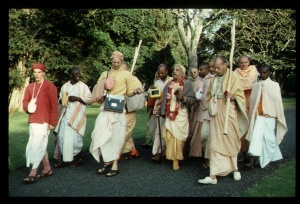SB 3.22.32: Difference between revisions
m (1 revision(s)) |
(Vanibot #0018 edit: make synonym terms in Sanskrit italic in SB - Vanisource) |
||
| Line 1: | Line 1: | ||
{{info | {{info | ||
|speaker=Maitreya | |speaker=Maitreya Ṛṣi | ||
|listener=Vidura | |listener=Vidura | ||
}} | }} | ||
[[Category:Srimad-Bhagavatam - Canto 03 Chapter 22]] | |||
[[Category:Bhagavatam Verses Spoken by Maitreya Rsi - Vanisource|032232]] | |||
<div style="float:left">'''[[Srimad-Bhagavatam]] - [[SB 3|Third Canto]] - [[SB 3.22: The Marriage of Kardama Muni and Devahuti|Chapter 22: The Marriage of Kardama Muni and Devahūti]]'''</div> | |||
<div style="float:right">[[File:Go-previous.png|link=SB 3.22.31]] '''[[SB 3.22.31]] - [[SB 3.22.33]]''' [[File:Go-next.png|link=SB 3.22.33]]</div> | |||
{{RandomImage}} | |||
==== TEXT 32 ==== | ==== TEXT 32 ==== | ||
<div | <div class="verse"> | ||
barhiṣmatīṁ nāma vibhur | :barhiṣmatīṁ nāma vibhur | ||
yāṁ nirviśya samāvasat | :yāṁ nirviśya samāvasat | ||
tasyāṁ praviṣṭo bhavanaṁ | :tasyāṁ praviṣṭo bhavanaṁ | ||
tāpa-traya-vināśanam | :tāpa-traya-vināśanam | ||
</div> | </div> | ||
| Line 16: | Line 22: | ||
==== SYNONYMS ==== | ==== SYNONYMS ==== | ||
<div | <div class="synonyms"> | ||
''barhiṣmatīm''—the city Barhiṣmatī; ''nāma''—named; ''vibhuḥ''—the very powerful Svāyambhuva Manu; ''yām''—which; ''nirviśya''—having entered; ''samāvasat''—he lived in previously; ''tasyām''—in that city; ''praviṣṭaḥ''—entered; ''bhavanam''—the palace; ''tāpa-traya''—the threefold miseries; ''vināśanam''—destroying. | |||
</div> | </div> | ||
| Line 23: | Line 29: | ||
==== TRANSLATION ==== | ==== TRANSLATION ==== | ||
<div | <div class="translation"> | ||
Having entered the city of Barhiṣmatī, in which he had previously lived, Manu entered his palace, which was filled with an atmosphere that eradicated the three miseries of material existence. | Having entered the city of Barhiṣmatī, in which he had previously lived, Manu entered his palace, which was filled with an atmosphere that eradicated the three miseries of material existence. | ||
</div> | </div> | ||
| Line 30: | Line 36: | ||
==== PURPORT ==== | ==== PURPORT ==== | ||
<div | <div class="purport"> | ||
The material world, or material existential life, is filled with threefold miseries: miseries pertaining to the body and mind, miseries pertaining to natural disturbances and miseries inflicted by other living entities. Human society is meant to create a spiritual atmosphere by spreading the spirit of Kṛṣṇa consciousness. The miseries of material existence cannot affect the status of Kṛṣṇa consciousness. It is not that the miseries of the material world completely vanish when one takes to Kṛṣṇa consciousness, but for one who is Kṛṣṇa conscious the miseries of material existence have no effect. We cannot stop the miseries of the material atmosphere, but Kṛṣṇa consciousness is the antiseptic method to protect us from being affected by the miseries of material existence. For a Kṛṣṇa conscious person, both living in heaven and living in hell are equal. How Svāyambhuva Manu created an atmosphere wherein he was not affected by material miseries is explained in the following verses. | The material world, or material existential life, is filled with threefold miseries: miseries pertaining to the body and mind, miseries pertaining to natural disturbances and miseries inflicted by other living entities. Human society is meant to create a spiritual atmosphere by spreading the spirit of Kṛṣṇa consciousness. The miseries of material existence cannot affect the status of Kṛṣṇa consciousness. It is not that the miseries of the material world completely vanish when one takes to Kṛṣṇa consciousness, but for one who is Kṛṣṇa conscious the miseries of material existence have no effect. We cannot stop the miseries of the material atmosphere, but Kṛṣṇa consciousness is the antiseptic method to protect us from being affected by the miseries of material existence. For a Kṛṣṇa conscious person, both living in heaven and living in hell are equal. How Svāyambhuva Manu created an atmosphere wherein he was not affected by material miseries is explained in the following verses. | ||
</div> | </div> | ||
__NOTOC__ | |||
<div style="float:right; clear:both;">[[File:Go-previous.png|link=SB 3.22.31]] '''[[SB 3.22.31]] - [[SB 3.22.33]]''' [[File:Go-next.png|link=SB 3.22.33]]</div> | |||
__NOTOC__ | |||
__NOEDITSECTION__ | |||
Revision as of 19:06, 30 November 2017

A.C. Bhaktivedanta Swami Prabhupada
TEXT 32
- barhiṣmatīṁ nāma vibhur
- yāṁ nirviśya samāvasat
- tasyāṁ praviṣṭo bhavanaṁ
- tāpa-traya-vināśanam
SYNONYMS
barhiṣmatīm—the city Barhiṣmatī; nāma—named; vibhuḥ—the very powerful Svāyambhuva Manu; yām—which; nirviśya—having entered; samāvasat—he lived in previously; tasyām—in that city; praviṣṭaḥ—entered; bhavanam—the palace; tāpa-traya—the threefold miseries; vināśanam—destroying.
TRANSLATION
Having entered the city of Barhiṣmatī, in which he had previously lived, Manu entered his palace, which was filled with an atmosphere that eradicated the three miseries of material existence.
PURPORT
The material world, or material existential life, is filled with threefold miseries: miseries pertaining to the body and mind, miseries pertaining to natural disturbances and miseries inflicted by other living entities. Human society is meant to create a spiritual atmosphere by spreading the spirit of Kṛṣṇa consciousness. The miseries of material existence cannot affect the status of Kṛṣṇa consciousness. It is not that the miseries of the material world completely vanish when one takes to Kṛṣṇa consciousness, but for one who is Kṛṣṇa conscious the miseries of material existence have no effect. We cannot stop the miseries of the material atmosphere, but Kṛṣṇa consciousness is the antiseptic method to protect us from being affected by the miseries of material existence. For a Kṛṣṇa conscious person, both living in heaven and living in hell are equal. How Svāyambhuva Manu created an atmosphere wherein he was not affected by material miseries is explained in the following verses.